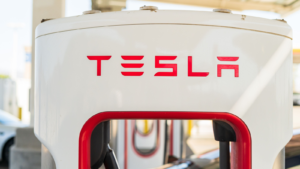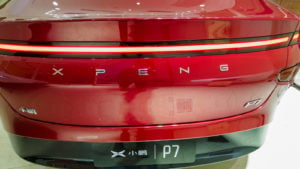
Shares of several electric vehicle makers are in the red as macroeconomic challenges and geopolitical tensions are weighing on the demand for electric vehicles. Moreover, the ongoing price war triggered by intense competition is dragging down the profitability of EV makers. Another concern is President Joe Biden’s quadrupling of tariffs on Chinese EV makers.
Nonetheless, the long-term prospects for the electric vehicle market remain strong, backed by policy support, focus on clean energy, increasing investment in supply chain, and the decline in EV prices. The International Energy Agency (IEA) estimates electric car sales to reach about 17 million in 2024, following a 35% growth to about 14 million units last year.
Bearing this backdrop in mind, I used TipRanks’ Stock Comparison Tool to compare the following EV stocks and pick the most attractive EV stock, as per Wall Street analysts.
Li Auto (LI)

Li Auto (NASDAQ:LI) is one of the prominent players in the Chinese EV market. The company recently reported a modest year-over-year rise of 0.4% in its April deliveries to 25,787 vehicles. However, April deliveries declined 11% from March, reflecting intense competition in the domestic market, macro challenges in China, and an unimpressive initial response to the company’s Li-Mega multi-purpose vehicle (MPV).
Last month, Li Auto cut prices of its entire line-up, except for the newly-launched L6, to fight the intense competition in the EV market. The company also announced refunds for owners who bought those models earlier this year.
Following the company’s price cuts, Morgan Stanley analyst Tim Hsiao reiterated a “buy” rating on LI stock with a price target of $65. The analyst believes that the “price cuts are timely.” Hsiao noted that the price reductions in the range of 18,000 to 30,000 yuan marked the first time the company officially slashed MSRP and came as the price war heats up in the Chinese market.
Analysts are optimistic about Li Auto’s prospects based on its strong execution, solid financials, and upcoming models. Earlier this month, Li Auto stock trended higher after the company revealed solid orders for its L6 model, its first model priced under 300,000 yuan. The company said that orders for L6 exceeded 41,000 from April 18 through May 5.
Including Hsiao, 11 analysts have a buy rating on Li Auto stock, while one has a hold rating, bringing the consensus rating to a “strong buy.” The average LI stock price target of $48.43 implies 81.45% upside potential.
Tesla (TSLA)

Tesla (NASDAQ:TSLA) stock has plunged this year due to growing concerns about the impact of competition from emerging players, declining margins, and regulatory pressures. News of layoffs by the Elon Musk-led company further impacted investor sentiment and raised questions about waning demand for its EVs.
Tesla’s first-quarter results clearly reflected the impact of ongoing pressures. The company’s revenue declined 9% to $21.3 billion while adjusted earnings per share (EPS) fell 47% to 45 cents. Moreover, the Q1 2024 operating margin contracted by 592 basis points year over year due to lower deliveries, the impact of price cuts, and costs associated with the Cybertruck production ramp.
While Tesla cautioned investors that it expects volume growth in 2024 to be significantly lower than in 2023, the company continues to be optimistic about its future. It is accelerating the launch of new models (including affordable EVs) and continues to work on its full-self driving (FSD) technology and its robo-taxi.
Earlier this month, Cantor Fitzgerald analyst Andres Sheppard initiated coverage of Tesla stock, with a “buy” recommendation and a price target of $230.
While Sheppard acknowledged the ongoing challenges in the EV space, he is optimistic about Tesla due to the potential of its FSD software, the launch of lower-priced models, its leading charging infrastructure, and a global manufacturing presence with economies of scale.
Overall, Wall Street has a “hold” consensus rating on Tesla based on 15 holds, eight buys, and nine Sells. At $173.19, the average TSLA stock price target implies modest upside of about 3%.
XPeng (XPEV)

Shares of Chinese EV maker XPeng (NYSE:XPEV) are down significantly so far this year, reflecting worries about the slowdown in demand in the world’s largest EV market.
Nonetheless, XPeng’s deliveries in recent months reflect its resilience in a challenging environment. The company delivered 9,393 EVs in April, reflecting 33% year-over-year growth and a 4% rise compared to March 2024.
Interestingly, XPeng is witnessing solid demand for its 7-seater X9, which it launched in January. In fact, X9 cumulative deliveries are nearing 10,000 units, including 1,959 vehicles in April.
While XPeng is still not profitable, it is confident about continued progress. The company’s XNGP Advanced Driver Assistance System (ADAS) is gaining traction, with its monthly active user penetration rate in urban driving scenarios reaching 82% in April. Also, the company is set to launch its new brand, MONA, in June.
Wall Street has a “moderate buy” rating on XPeng, backed by eight buys, four holds, and two sells. The average XPEV stock price target of $12.24 implies 58% upside potential.
On the date of publication, Sirisha Bhogaraju did not have (either directly or indirectly) any positions in the securities mentioned in this article. The opinions expressed in this article are those of the writer, subject to the InvestorPlace.com Publishing Guidelines.




